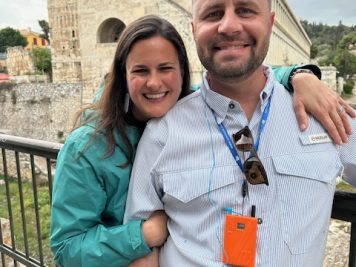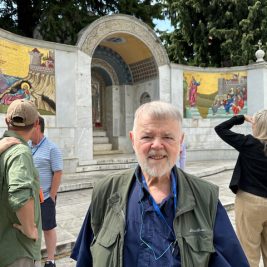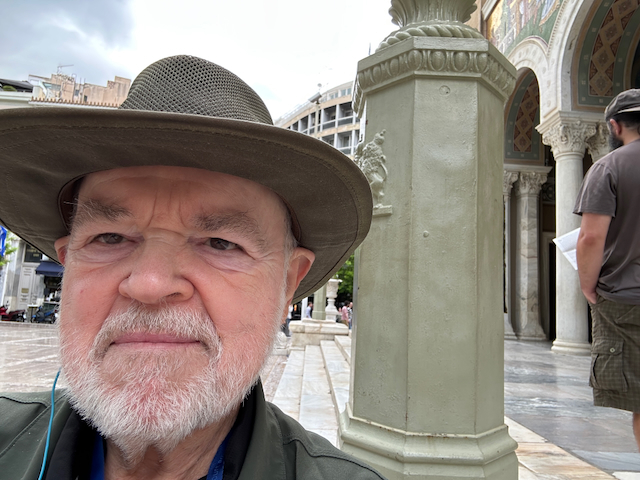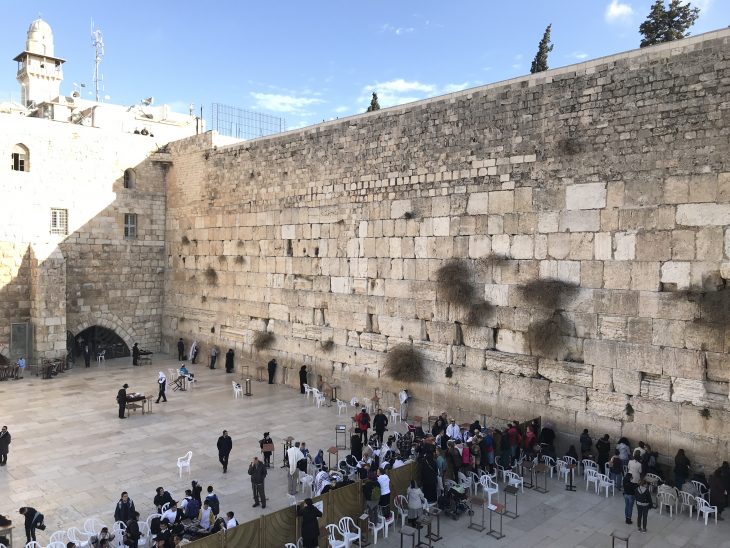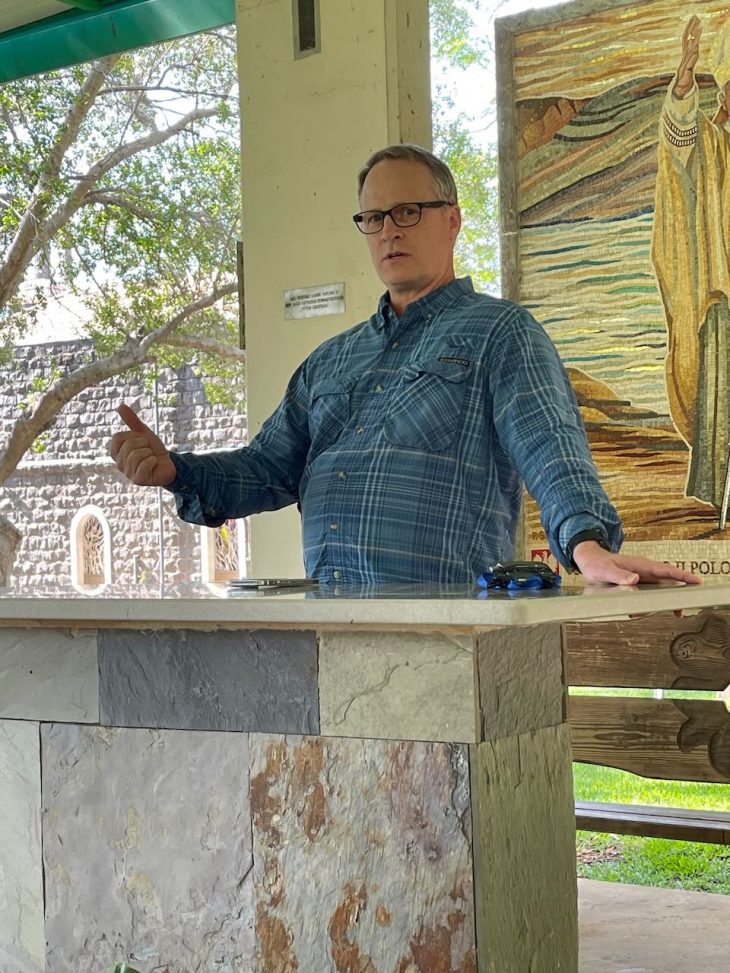Days 1–30 — Returning to God
Confession, repentance, cleansing, surrender, humility, forgiveness, healing
Days 31–60 — Resting in God
Praise, assurance, peace, identity in Christ, trust, hope, joy, presence
Days 61–90 — Walking with God
Obedience, calling, witness, endurance, spiritual maturity, eternal focus, finishing well
DAYS 1-30 RETURNING TO GOD
DAY 1 — COMING HOME TO GOD
Luke 15:20
“But while he was still a long way off, his father saw him and felt compassion for him, and ran and embraced him and kissed him.”
Every true devotional journey begins the same way: not with effort, but with return.
God does not wait coldly for repentance to be perfect. He runs toward the heart that simply turns.
Before discipline, before growth, before obedience—there is mercy.
The Christian life is not maintained by strength but restored again and again by the compassion of the Father revealed in Jesus Christ.
- God sees movement toward Him before we arrive.
- Compassion is His first response, not condemnation.
- Jesus is the open embrace of the Father.
What do I do today
- Turn honestly toward God without hiding.
- Believe His welcome more than my shame.
- Rest in mercy before trying to improve.
Prayer
Father, I come home again.
Not with strength, not with excuses, not with promises of doing better—only with need.
Thank You that Your heart moves toward me before my words are finished.
Let this day begin inside Your embrace, where shame loses its voice and mercy speaks louder.
Keep me near You, not by fear, but by love.
Amen.
Poem — The Way Back
I thought distance changed Your heart.
I thought failure closed the door.
I was wrong.
You saw me turning.
That was enough for You to run.
Mercy moved first.
No speech was needed.
Only Your arms around me.
Only welcome.
So I stay here now.
Home in Your compassion.
Home with You.
Journal Reflection
Where have I felt far from God?
What would it mean to believe He is running toward me today?
DAY 2 — HONEST BEFORE GOD
Psalm 51:6
“Behold, You desire truth in the innermost being,
And in the hidden part You will make me know wisdom.”
God is never helped by my pretending.
Spiritual life begins where honesty begins.
The Lord is not searching for polished words but truthful hearts.
When truth enters the hidden places, wisdom follows, and healing quietly begins.
- God values honesty more than appearance.
- Hidden truth becomes the doorway to change.
- Christ meets us in reality, not performance.
What do I do today
- Tell God the truth about my heart.
- Refuse spiritual pretending.
- Welcome His cleansing light.
Prayer
Lord, You already know what I try to hide.
Teach me the freedom of complete honesty before You.
Let truth reach the deepest places of my soul where fear and habit still live.
I trust Your mercy more than I fear exposure.
Make my inner life clean and steady in Your presence.
Amen.
Poem — No More Hiding
I covered what You already saw.
I guarded what You already knew.
It only made me tired.
Your light was not cruel.
It was gentle and clear.
Safe enough for truth.
Nothing hidden stayed powerful.
Nothing confessed stayed dark.
Freedom entered quietly.
Now I live uncovered.
Known completely.
Loved completely.
Journal Reflection
What truth do I need to speak honestly to God today?
DAY 3 — CLEANSED AND NEW
1 John 1:9
“If we confess our sins, He is faithful and righteous to forgive us our sins and to cleanse us from all unrighteousness.”
Forgiveness is not fragile.
It rests on the finished work of Jesus, not the strength of my repentance.
When God forgives, He also cleanses.
The past may remember, but heaven does not accuse.
Grace does not merely excuse—it makes new.
- God’s faithfulness guarantees forgiveness.
- Cleansing is as real as pardon.
- The cross fully settles sin.
What do I do today
- Confess specifically and trust completely.
- Refuse returning shame.
- Walk forward as one made clean.
Prayer
Jesus, thank You that forgiveness is certain because of You.
I bring my sin into the light of Your cross and leave it there.
Wash not only my record but my heart.
Teach me to live this day as someone truly cleansed, not someone still condemned.
Let freedom become my normal life in You.
Amen.
Poem — Washed
Guilt spoke loudly yesterday.
Memory repeated every failure.
Peace stayed distant.
Then mercy answered.
Not with argument, but blood.
Not with delay, but cleansing.
Silence replaced accusation.
Light replaced shame.
Freedom stood near.
Now I walk forward clean.
Not because I am strong.
Because You forgave me.
Journal Reflection
Do I truly believe I am forgiven?
What changes if I live today as someone completely cleansed?
DAY 4 — SURRENDERING CONTROL
Proverbs 16:9
“The mind of man plans his way, but the Lord directs his steps.”
We plan. God governs.
Surrender is not passivity—it is trust.
The Father’s direction is steadier than my intention.
Growth begins when I release the illusion of control and rest in divine sovereignty.
- God’s direction is wiser than my design.
- Surrender frees the soul from anxiety.
- Jesus Himself lived yielded to the Father’s will.
What do I do today
- Place my plans before God without gripping them.
- Accept interruptions as possible direction.
- Trust outcomes to Him.
Prayer
Father, I confess how tightly I hold my plans. Teach me to open my hands. Direct my steps beyond my sight and align my heart with Your will. Let surrender bring peace instead of fear. I trust You with this day. Amen.
Poem — Open Hands
I planned every detail.
Still the day felt uncertain.
Control slipped quietly.
You asked for my hands.
Not to take away hope.
But to give better direction.
Tension left slowly.
Trust settled in.
Peace followed surrender.
Now I walk lighter.
Not steering alone.
Led by You.
Journal Reflection
What am I trying to control that I need to release to God?
DAY 5 — TRUSTING IN DARKNESS
Isaiah 50:10
“Who is among you that fears the Lord… that walks in darkness and has no light? Let him trust in the name of the Lord and rely on his God.”
Faith is most real when sight is absent.
Darkness does not mean abandonment.
Trust is leaning on God when clarity has not yet come.
- God is present even when unseen.
- Darkness refines faith.
- Christ endured darkness trusting the Father.
What do I do today
- Trust God without full explanation.
- Refuse panic in uncertainty.
- Speak faith over fear.
Prayer
Lord, when clarity fades, keep my heart steady. Let trust rise above confusion. Teach me to rely on Your name when the path is hidden. Amen.
Poem — When I Cannot See
Light faded quickly.
Answers grew quiet.
Questions multiplied.
Still You remained.
Unmoved by the dark.
Faithful without sight.
I leaned into trust.
Small but real.
Enough for the next step.
Now I wait calmly.
Not because I see.
Because I believe.
Journal Reflection
Where do I need to trust God without understanding today?
DAY 6 — RESTING IN GRACE
Hebrews 4:16
“Let us draw near with confidence to the throne of grace…”
Grace invites approach, not retreat.
Confidence is not arrogance—it is reliance on Christ’s finished work.
- The throne is a throne of grace.
- Christ gives access boldly.
- Rest replaces striving.
What do I do today
- Come to God without hesitation.
- Ask freely for help.
- Rest in acceptance.
Prayer
Jesus, thank You that grace invites me close. Keep me from striving for what You have already given. Let confidence grow from Your cross, not my performance. Amen.
Poem — The Throne of Grace
I stood far away.
Uncertain if I belonged.
Grace called me closer.
The throne was not cold.
It welcomed weakness.
It welcomed need.
Confidence felt new.
Not pride, but trust.
Not fear, but peace.
Now I draw near.
Because of You.
Always because of You.
Journal Reflection
Do I approach God freely, or do I hesitate?
DAY 7 — RECEIVING GOD’S CORRECTION
Hebrews 12:6
“For those whom the Lord loves He disciplines…”
Correction is not rejection.
God shapes sons and daughters through loving discipline.
- Discipline flows from love.
- Correction produces righteousness.
- Jesus learned obedience through suffering.
What do I do today
- Accept correction humbly.
- Learn instead of resist.
- Thank God for refining love.
Prayer
Father, help me receive Your correction without defensiveness. Shape my character through Your loving discipline. Amen.
Poem — Loving Correction
It felt sharp at first.
Like something breaking.
Like something lost.
Then I saw love.
Not anger.
Not distance.
Correction became care.
Refining, not rejecting.
Restoring, not condemning.
Now I submit quietly.
Trusting Your hands.
Trusting Your heart.
Journal Reflection
How has God used correction in my life for good?
DAY 8 — EMBRACING HUMILITY
Philippians 2:5–7
“Have this attitude… which was also in Christ Jesus… He emptied Himself…”
Humility is strength under control.
Christ lowered Himself so I could be lifted.
- Jesus models humility.
- Humility opens the door to grace.
- Pride blocks spiritual growth.
What do I do today
- Choose the low place.
- Serve without recognition.
- Honor others above myself.
Prayer
Lord Jesus, form Your humility in me. Remove pride quietly and teach me to serve with joy. Amen.
Poem — The Low Road
You chose the lower path.
Not the louder one.
Not the easier one.
Power knelt.
Glory served.
Heaven stooped low.
I resist that way.
Still You invite me.
Still You show me.
Now I choose again.
The quiet road.
The humble one.
Journal Reflection
Where is God asking me to choose humility?
DAY 9 — LEARNING CONTENTMENT
Philippians 4:11
“I have learned to be content in whatever circumstances I am.”
Contentment is learned, not inherited.
It grows when Christ becomes enough.
- Contentment rests in Christ.
- Circumstances do not define joy.
- Gratitude strengthens peace.
What do I do today
- Thank God for what I have.
- Refuse comparison.
- Seek Christ above comfort.
Prayer
Lord, teach me holy contentment. Let my heart be satisfied in You regardless of outward change. Amen.
Poem — Enough Today
I looked at what was missing.
Peace slipped quietly away.
Desire multiplied.
You showed me Yourself.
Steady and sufficient.
Closer than lack.
Wanting grew quiet.
Gratitude spoke softly.
Peace returned.
Now today is enough.
Because You are enough.
Always enough.
Journal Reflection
What would change if I truly believed Christ is sufficient?
DAY 10 — WALKING IN OBEDIENCE
John 14:15
“If you love Me, you will keep My commandments.”
Obedience is love expressed.
Faith is proven by following.
- Love motivates obedience.
- Obedience deepens intimacy.
- Christ empowers what He commands.
What do I do today
- Obey promptly.
- Trust His wisdom.
- Follow closely.
Prayer
Lord Jesus, let my love for You become visible through obedience. Strengthen me to follow without hesitation. Amen.
Poem — Following
You did not ask for words alone.
You asked for steps.
You asked for trust.
Love moved forward.
One command at a time.
One choice at a time.
Obedience felt simple.
Not always easy.
But always right.
Now I follow You.
Not perfectly.
But faithfully.
Journal Reflection
What simple act of obedience is God calling me to today?
DAY 11 — ABIDING IN CHRIST
John 15:4
“Abide in Me, and I in you. As the branch cannot bear fruit of itself unless it abides in the vine, so neither can you unless you abide in Me.”
The Christian life is not sustained by effort but by union.
Fruit grows from closeness, not striving.
Abiding is the quiet decision to remain where life flows.
- Separation from Christ produces emptiness.
- Abiding releases divine life within us.
- Jesus is both the source and the strength of fruitfulness.
What do I do today
- Stay aware of Christ’s presence.
- Return quickly when distracted.
- Depend on Him in small moments.
Prayer
Lord Jesus, keep me near You today. Save me from restless striving and draw me into quiet dependence. Let Your life flow through mine in every thought, word, and step. Amen.
Poem — Staying Close
I tried to grow alone.
Nothing lasting formed.
Effort faded quickly.
You spoke of staying.
Not striving, just remaining.
Life lived near You.
Quiet strength appeared.
Fruit formed slowly.
Peace stayed steady.
Now I remain here.
Close to the Vine.
Close to You.
Journal Reflection
What helps me remain consciously near to Christ during ordinary moments?
DAY 12 — LIVING BY FAITH
2 Corinthians 5:7
“For we walk by faith, not by sight.”
Faith is forward movement without full visibility.
Sight demands certainty; faith trusts character.
- Faith anchors in God’s nature.
- Walking implies daily dependence.
- Christ leads beyond what we can see.
What do I do today
- Trust God’s promises over circumstances.
- Take the next faithful step.
- Refuse fear of the unknown.
Prayer
Father, teach me to walk steadily even when I cannot see the path ahead. Let faith become the rhythm of my daily life and trust the language of my heart. Amen.
Poem — One Step
I wanted full clarity.
You offered the next step.
That was enough.
Sight stayed limited.
Faith kept moving.
Trust carried me.
The road unfolded slowly.
Peace walked beside me.
Fear fell behind.
Now I keep stepping.
Not because I see.
Because You lead.
Journal Reflection
Where is God asking me to trust Him without full understanding?
DAY 13 — GOD AS MY REFUGE
Psalm 46:1
“God is our refuge and strength, a very present help in trouble.”
Refuge is not escape from reality but safety within it.
God does not always remove storms—He becomes shelter inside them.
- Trouble does not cancel God’s presence.
- Strength is found in nearness to Him.
- Christ is the living refuge of the soul.
What do I do today
- Run to God first in difficulty.
- Speak honestly in prayer.
- Rest in His protection.
Prayer
Lord, be my refuge today. When pressure rises, draw me quickly into Your safety. Let Your strength hold what I cannot carry. Amen.
Poem — Safe Place
Noise surrounded me.
Fear pressed close.
Escape seemed far.
You opened shelter.
Strong and quiet.
Near enough to enter.
The storm still moved.
But I was held.
That changed everything.
Now I stay inside.
Safe with You.
Always safe.
Journal Reflection
Do I run to God first or last when trouble comes?
DAY 14 — RENEWED STRENGTH
Isaiah 40:31
“Yet those who wait for the Lord will gain new strength…”
Waiting is not wasted time.
God renews those who remain expectant before Him.
- Waiting positions the heart for renewal.
- Strength is God’s gift, not human achievement.
- Hope rises in patient trust.
What do I do today
- Slow down before God.
- Choose hope over hurry.
- Trust His timing.
Prayer
Renew my strength today, Lord. Teach me the quiet power of waiting on You instead of rushing ahead of You. Amen.
Poem — While Waiting
I feared stillness.
Silence felt empty.
Waiting felt lost.
But You worked there.
Hidden yet faithful.
Quiet yet strong.
Strength returned slowly.
Hope lifted gently.
Peace breathed again.
Now I wait differently.
Certain of You.
Certain of renewal.
Journal Reflection
What might God be doing in seasons where I feel delayed?
DAY 15 — THE PEACE OF GOD
Philippians 4:7
“And the peace of God, which surpasses all comprehension, will guard your hearts and your minds in Christ Jesus.”
God’s peace is deeper than explanation.
It guards the heart like a quiet soldier.
- Peace comes through prayerful surrender.
- Christ Himself is our peace.
- Guarded hearts remain steady in chaos.
What do I do today
- Pray instead of worry.
- Release control to God.
- Rest in Christ’s calm.
Prayer
Prince of Peace, guard my heart today. Let Your calm rule deeper than my thoughts and stronger than my fears. Amen.
Poem — Guarded
Anxiety circled loudly.
Thoughts would not rest.
Fear stayed near.
Then peace arrived.
Quiet and firm.
Stronger than noise.
My heart slowed.
My mind settled.
Stillness held me.
Now I rest safely.
Guarded by peace.
Guarded by You.
Journal Reflection
What worries do I need to surrender to God right now?
DAY 16 — GOD KNOWS MY WAY
Psalm 139:3
“You scrutinize my path… and are intimately acquainted with all my ways.”
Nothing about my life is hidden from God.
Being fully known is not frightening when love is perfect.
- God’s knowledge is personal, not distant.
- He guides with complete understanding.
- Christ knows us and still loves us fully.
What do I do today
- Trust God’s awareness of my life.
- Stop pretending before Him.
- Walk honestly.
Prayer
Lord, thank You for knowing me completely and loving me fully. Guide my steps with Your perfect understanding today. Amen.
Poem — Fully Known
You saw every step.
Nothing hidden from You.
Nothing misunderstood.
I feared exposure.
But love met me there.
Gentle and sure.
Being known felt safe.
Being loved felt real.
Peace settled in.
Now I walk openly.
Nothing to hide.
Nothing to fear.
Journal Reflection
How does it change my heart to know God understands everything about me?
DAY 17 — GOD WORKS ALL THINGS
Romans 8:28
“And we know that God causes all things to work together for good to those who love God…”
God wastes nothing.
Even pain becomes material for redemption.
- God’s purpose is greater than circumstance.
- Good may unfold slowly.
- Christ redeems every story.
What do I do today
- Trust God in difficulty.
- Refuse despair.
- Look for His work.
Prayer
Faithful God, help me trust that nothing in my life is meaningless. Weave even my struggles into Your good purpose. Amen.
Poem — Not Wasted
I thought this pain was useless.
Only loss, only sorrow.
Nothing good ahead.
But You were working.
Quietly, patiently.
Beyond my sight.
Threads began joining.
Meaning formed slowly.
Hope returned.
Now I trust the weaving.
Every piece held.
Every piece Yours.
Journal Reflection
Where might God be working good that I cannot yet see?
DAY 18 — GOD’S UNFAILING LOVE
Lamentations 3:22
“The Lord’s lovingkindnesses indeed never cease…”
Love that never ceases becomes the anchor of the soul.
- God’s love is constant.
- Morning mercy proves faithfulness.
- Christ embodies unfailing love.
What do I do today
- Remember His love.
- Reject despair.
- Live gratefully.
Prayer
Loving Father, let Your constant love steady my emotions and shape my hope today. Amen.
Poem — Still Loving
Feelings changed quickly.
Circumstances shifted.
Nothing felt stable.
But Your love remained.
Quiet and certain.
Unmoved by time.
Morning carried mercy.
Evening carried peace.
Grace filled the day.
Now I rest secure.
Loved without end.
Loved by You.
Journal Reflection
How has God shown His unfailing love to me recently?
DAY 19 — GOD IS MY SHEPHERD
Psalm 23:1
“The Lord is my shepherd, I shall not want.”
Shepherding means guidance, provision, and protection together.
- God personally leads His people.
- Provision flows from relationship.
- Jesus is the Good Shepherd.
What do I do today
- Follow His voice.
- Trust His care.
- Rest in His provision.
Prayer
Good Shepherd, lead me gently today. Keep me near Your voice and satisfied in Your care. Amen.
Poem — Led
I feared being lost.
Paths felt uncertain.
Direction felt unclear.
Then I heard Your voice.
Soft but steady.
Calling me forward.
Provision met me there.
Peace walked beside me.
Fear faded away.
Now I follow quietly.
Safe in Your lead.
Safe with You.
Journal Reflection
Where do I sense God leading me right now?
DAY 20 — STILL WATERS
Psalm 23:2
“He leads me beside quiet waters.”
God restores through rest, not hurry.
- Rest is spiritual, not merely physical.
- God leads into renewal.
- Christ invites the weary to come.
What do I do today
- Slow down intentionally.
- Sit quietly with God.
- Receive restoration.
Prayer
Lord, lead me into quiet today. Restore the parts of me that hurry has worn thin. Let stillness become healing in Your presence. Amen.
Poem — Quiet Waters
Noise followed me everywhere.
Rest felt unreachable.
Silence felt strange.
You led me slowly.
Away from rushing.
Toward still water.
My soul breathed again.
Peace spread gently.
Strength returned.
Now I remain here.
Quiet with You.
Restored by You.
Journal Reflection
What would it look like to accept God’s invitation to rest today?
DAY 21 — DRAWING NEAR TO GOD
James 4:8
“Draw near to God and He will draw near to you.”
Distance from God is never His decision.
Nearness begins with a turning heart.
Every step toward Him is met with greater grace.
- God welcomes approach, not perfection.
- Nearness restores intimacy.
- Christ is the open way to the Father.
What do I do today
- Set aside quiet time with God.
- Speak honestly in prayer.
- Turn my attention toward Him throughout the day.
Prayer
Father, I come close again today. Thank You that You never resist a heart that turns toward You. Let nearness replace distraction and fellowship replace distance. Keep me aware of You in every ordinary moment. Amen.
Poem — Closer
I drifted without noticing.
Silence grew between us.
Distance felt normal.
Then I turned back.
Only a small step.
But You were already near.
Nothing blocked the way.
Grace stood open.
Welcome felt real.
Now I remain close.
Not by effort.
But by love.
Journal Reflection
What simple step can I take today to draw nearer to God?
DAY 22 — SEEKING GOD FIRST
Matthew 6:33
“But seek first His kingdom and His righteousness, and all these things will be added to you.”
Order shapes peace.
When God is first, everything else finds its place.
Disorder in priorities creates disorder in the soul.
- First things determine lasting direction.
- God provides what follows obedience.
- Christ is the center of a rightly ordered life.
What do I do today
- Begin the day with God before anything else.
- Measure choices by eternal value.
- Trust Him with practical needs.
Prayer
Lord, reorder my heart today. Teach me to place You first in thought, time, and desire. Let everything else fall into its proper place beneath Your rule. Amen.
Poem — First
I filled my day with many things.
Still peace felt missing.
Still rest stayed far.
You asked for first place.
Not leftovers.
Not fragments.
When You became first,
everything else settled.
Everything else quieted.
Now I begin with You.
And the day holds together.
Journal Reflection
What competes with God for first place in my life?
DAY 23 — LISTENING FOR GOD’S VOICE
John 10:27
“My sheep hear My voice, and I know them, and they follow Me.”
God is not silent.
The problem is rarely His speaking but my listening.
Stillness trains the ear of the soul.
- Relationship makes recognition possible.
- Listening precedes obedience.
- Christ’s voice leads toward life.
What do I do today
- Slow down long enough to listen.
- Read Scripture attentively.
- Respond when God speaks.
Prayer
Good Shepherd, quiet the noise within me so I can hear You clearly. Teach me to recognize Your voice and follow without hesitation. Amen.
Poem — Hearing
Noise filled every space.
Your voice felt distant.
Silence felt rare.
Then quiet came.
Soft and steady.
Enough to hear.
Your words were gentle.
Clear and calm.
Full of life.
Now I listen closely.
Ready to follow.
Ready to trust.
Journal Reflection
How might God already be speaking to me?
DAY 24 — TRUSTING GOD’S TIMING
Ecclesiastes 3:11
“He has made everything appropriate in its time.”
God is never late.
Delay often prepares what arrival cannot.
Time belongs to Him.
- Waiting is purposeful, not empty.
- God sees the whole story.
- Christ fulfilled every promise at the right time.
What do I do today
- Release my urgency to God.
- Trust unseen preparation.
- Remain faithful while waiting.
Prayer
Lord, teach me to trust Your timing when mine feels urgent. Give me patience rooted in confidence that You are never late. Amen.
Poem — Not Late
I watched the clock closely.
Nothing seemed to move.
Hope felt delayed.
But You were working.
Hidden and sure.
Beyond my sight.
The moment arrived quietly.
Right, complete, perfect.
Just as You planned.
Now I trust the waiting.
Because I trust You.
Journal Reflection
Where am I struggling with God’s timing?
DAY 25 — RESTORATION OF THE SOUL
Psalm 23:3
“He restores my soul.”
God repairs what life wears down.
Restoration is gentle, not rushed.
Healing grows in His presence.
- God cares about inner weariness.
- Restoration is ongoing.
- Christ restores completely.
What do I do today
- Admit where I am tired.
- Spend unhurried time with God.
- Receive His restoring grace.
Prayer
Shepherd of my soul, restore what is weary within me. Breathe new life into places that feel drained and quiet my heart in Your care. Amen.
Poem — Restored
I kept moving while empty.
Strength slowly faded.
Joy felt thin.
You called me to stop.
To sit beside You.
To breathe again.
Life returned gently.
Peace followed slowly.
Hope rose quietly.
Now my soul feels whole.
Because You restored me.
Journal Reflection
Where do I most need God’s restoration?
DAY 26 — STANDING IN GRACE
Romans 5:2
“…through whom also we have obtained our introduction by faith into this grace in which we stand…”
Grace is not only the beginning—it is the ground beneath every step.
We do not visit grace; we live in it.
- Grace is the believer’s position.
- Faith keeps us standing there.
- Christ secured permanent access.
What do I do today
- Reject performance-based thinking.
- Rest in acceptance through Christ.
- Walk confidently in grace.
Prayer
Jesus, thank You that I stand in grace today. Keep me from striving to earn what You already gave. Let confidence grow from Your finished work. Amen.
Poem — Standing
I tried to prove myself.
Nothing felt secure.
Peace stayed fragile.
Then grace became ground.
Strong and certain.
Holding my weight.
Fear lost its argument.
Shame lost its voice.
Rest settled in.
Now I stand steady.
Because grace holds me.
Journal Reflection
Do I live from grace or from pressure to perform?
DAY 27 — STRENGTH IN WEAKNESS
2 Corinthians 12:9
“My grace is sufficient for you, for power is perfected in weakness.”
Weakness is not the end of usefulness.
It is often the beginning of dependence.
- God’s power meets human limitation.
- Grace proves sufficient in struggle.
- Christ shines brightest through weakness.
What do I do today
- Admit where I am weak.
- Depend on God’s strength.
- Stop pretending self-sufficiency.
Prayer
Lord, I bring You my weakness without shame. Let Your strength rest upon me and show Your power through my limitations today. Amen.
Poem — Enough Strength
I tried to appear strong.
Inside I felt fragile.
Effort kept failing.
You spoke of grace.
Quiet but powerful.
Enough for me.
Weakness became doorway.
Strength entered slowly.
Hope stood firm.
Now I depend on You.
And that is enough.
Journal Reflection
Where might God want to show His strength through my weakness?
DAY 28 — WALKING IN THE SPIRIT
Galatians 5:16
“Walk by the Spirit, and you will not carry out the desire of the flesh.”
The Christian life is not self-control alone but Spirit-control.
Victory comes from walking with Him step by step.
- The Spirit leads daily living.
- Dependence replaces struggle.
- Christ’s life is formed within us.
What do I do today
- Invite the Spirit’s guidance.
- Pause before reacting.
- Choose obedience in small moments.
Prayer
Holy Spirit, guide my thoughts, words, and choices today. Lead me away from sin and deeper into the life of Christ. Amen.
Poem — Step by Step
I tried harder each day.
Still I kept failing.
Still I felt stuck.
Then You began leading.
Quiet directions.
Gentle strength.
One step changed.
Then another.
Freedom slowly formed.
Now I walk with You.
Not alone.
Not defeated.
Journal Reflection
Where do I need to follow the Spirit instead of my impulses?
DAY 29 — HOPE OF GLORY
Colossians 1:27
“…Christ in you, the hope of glory.”
The future of the believer is not uncertain.
Christ within guarantees glory ahead.
Hope is living forward toward eternity.
- Christ’s presence secures the future.
- Glory reshapes present suffering.
- Hope gives endurance.
What do I do today
- Remember eternity.
- Endure present difficulty.
- Fix my heart on Christ.
Prayer
Lord Jesus, thank You that my future is secure in You. Let eternal hope strengthen me for every challenge I face today. Amen.
Poem — Glory Ahead
The road felt long.
Suffering felt heavy.
End felt unclear.
Then hope appeared.
Bright and certain.
Pointing forward.
You were already there.
Waiting in glory.
Holding my future.
Now I keep walking.
Because hope lives.
Because You live.
Journal Reflection
How would eternal hope change the way I face today?
DAY 30 — FINISHING THIS FIRST JOURNEY WITH PRAISE
Jude 24–25
“Now to Him who is able to keep you from stumbling… be glory, majesty, dominion and authority…”
God not only begins salvation—He keeps it.
Praise becomes the natural end of remembering grace.
- God preserves His people.
- Security produces worship.
- Christ will present us blameless.
What do I do today
- Thank God for sustaining grace.
- End this season with praise.
- Trust Him for the journey ahead.
Prayer
Faithful God, You have carried me through every step so far. Keep me steady in the days ahead and let my life remain a song of praise to You alone. Amen.
Poem — Kept
I feared I would fall.
I feared I would fail.
I feared the end.
But You kept holding me.
Day after day.
Grace after grace.
The journey was Yours.
The strength was Yours.
The victory is Yours.
So I end in praise.
And begin again.
Still with You.
Journal Reflection
How have I seen God keep me through this season?
Days 31–60 — Resting in God
DAY 31 — REST FOR THE WEARY
Matthew 11:28
“Come to Me, all who are weary and heavy-laden, and I will give you rest.”
Rest is not escape from responsibility but refuge in Christ.
Jesus does not demand strength before welcome.
He offers rest as the starting place of renewal.
- Christ invites the tired, not the strong.
- Rest is received, not earned.
- Nearness to Jesus restores the soul.
What do I do today
- Admit my weariness honestly.
- Sit quietly with Christ.
- Release the weight I carry.
Prayer
Lord Jesus, I come tired and in need of You. Give me the rest only You can give. Quiet my striving and restore my soul in Your presence today. Amen.
Poem — Come and Rest
I carried more than I could hold.
Still I kept walking.
Still I kept striving.
You said to come.
Not later.
Now.
Rest felt unfamiliar.
But peace began there.
Strength returned slowly.
Now I remain near You.
Held in quiet.
Held in rest.
Journal Reflection
What burden do I need to lay down before Christ today?
DAY 32 — THE GOD WHO SUSTAINS
Psalm 55:22
“Cast your burden upon the Lord and He will sustain you.”
God does not merely remove burdens—He sustains the one who carries them.
Strength flows from dependence.
- God supports what we surrender.
- Sustaining grace is daily, not distant.
- Christ carries what crushes us.
What do I do today
- Name my burden in prayer.
- Release it deliberately.
- Trust God to sustain me.
Prayer
Faithful Sustainer, hold me steady today. Carry what feels too heavy and keep my heart from collapsing under the weight. Amen.
Poem — Held Up
The burden felt constant.
Pressure stayed close.
Strength felt thin.
You did not disappear.
You held me upright.
You stayed near.
Nothing changed outside.
But inside I stood.
Because You sustained me.
Now I keep walking.
Supported by grace.
Supported by You.
Journal Reflection
Where do I most need God’s sustaining strength?
DAY 33 — PEACEFUL TRUST
Isaiah 26:3
“The steadfast of mind You will keep in perfect peace, because he trusts in You.”
Peace is guarded by trust.
A fixed mind creates a quiet heart.
- Trust stabilizes thought.
- God Himself keeps the peace.
- Christ is the center of calm.
What do I do today
- Fix my thoughts on God.
- Refuse anxious spirals.
- Rest in His keeping.
Prayer
God of peace, steady my mind in You today. Let trust guard my thoughts and calm settle deep within my heart. Amen.
Poem — Perfect Peace
Thoughts rushed quickly.
Fear followed closely.
Rest slipped away.
Then I turned toward You.
Stillness answered.
Calm settled in.
Nothing forced the peace.
You simply kept it.
Quiet and strong.
Now my mind rests.
Centered in trust.
Centered in You.
Journal Reflection
What thought pattern most steals my peace?
DAY 34 — SAFE IN GOD’S HANDS
John 10:28
“No one will snatch them out of My hand.”
Security in Christ is absolute, not fragile.
The believer’s safety rests in His grip, not ours.
- Salvation is held by Christ’s power.
- Fear cannot overrule His promise.
- Eternal security produces deep rest.
What do I do today
- Reject fear of losing God.
- Trust Christ’s hold on me.
- Live from assurance.
Prayer
Lord Jesus, thank You that I am safe in Your hands. Quiet every fear that questions Your keeping power and let assurance deepen my rest today. Amen.
Poem — Held Forever
I feared slipping away.
I feared losing ground.
I feared the end.
But Your hand remained.
Firm and certain.
Never loosening.
Fear lost its voice.
Peace grew strong.
Hope stood steady.
Now I rest secure.
Held forever.
Held by You.
Journal Reflection
Do I live from security in Christ or fear of failure?
DAY 35 — STILLNESS BEFORE GOD
Psalm 46:10
“Cease striving and know that I am God.”
Stillness reveals sovereignty.
When striving stops, worship begins.
- Striving hides trust.
- Stillness awakens awareness of God.
- Christ invites quiet surrender.
What do I do today
- Pause intentionally.
- Sit in silence before God.
- Let Him be enough.
Prayer
Sovereign Lord, teach me to be still. Silence my restless striving and let deep awareness of You fill this day. Amen.
Poem — Be Still
Noise filled everything.
Movement never stopped.
Peace felt distant.
You spoke one word.
Still.
Enough.
Striving loosened slowly.
Silence opened space.
Presence filled it.
Now I remain quiet.
Knowing You are God.
Knowing You are here.
Journal Reflection
What keeps me from stillness with God?
DAY 36 — SATISFIED IN GOD
Psalm 63:1
“My soul thirsts for You…”
Only God satisfies the deepest thirst.
Every lesser pursuit leaves emptiness.
- Spiritual hunger points toward God.
- Satisfaction is relational, not material.
- Christ is living water.
What do I do today
- Seek God before comfort.
- Turn desire toward Him.
- Drink deeply from His presence.
Prayer
Lord, satisfy my soul in ways nothing else can. Turn my deepest hunger toward You alone today. Amen.
Poem — Thirst
I searched everywhere.
Still I felt empty.
Still I longed.
Then I found You.
Quiet and living.
Water for my soul.
Thirst softened slowly.
Peace filled the space.
Rest followed.
Now I return daily.
To drink again.
To live again.
Journal Reflection
Where am I trying to find satisfaction apart from God?
DAY 37 — THE LORD IS MY PORTION
Lamentations 3:24
“The Lord is my portion… therefore I have hope in Him.”
Hope grows when God Himself is enough.
Portion means inheritance, security, and future.
- God is the believer’s true wealth.
- Hope rests in relationship.
- Christ fulfills every longing.
What do I do today
- Value God above possessions.
- Trust Him as my future.
- Live with eternal perspective.
Prayer
Father, remind me that You are my greatest treasure. Let hope grow strong because my future rests in You alone. Amen.
Poem — My Portion
I counted what I owned.
Still I felt poor.
Still uncertain.
Then I saw You.
Enough forever.
Enough today.
Hope returned quietly.
Security followed.
Peace settled in.
Now You are my portion.
Nothing greater.
Nothing needed.
Journal Reflection
What do I treat as my real security besides God?
DAY 38 — QUIET CONFIDENCE
Isaiah 30:15
“In quietness and trust is your strength.”
God’s strength often arrives silently.
Noise is not power—trust is.
- Quiet hearts receive strength.
- Trust produces resilience.
- Christ displayed calm authority.
What do I do today
- Choose calm over panic.
- Trust instead of striving.
- Walk steadily.
Prayer
Lord, form quiet confidence within me. Let trust become my strength and calm my witness today. Amen.
Poem — Quiet Strength
I expected loud rescue.
Instead You brought calm.
Soft but strong.
Nothing dramatic changed.
But inside I stood firm.
Peace held me.
Trust grew roots.
Strength rose quietly.
Hope stayed.
Now I walk calmly.
Carried by quiet.
Carried by You.
Journal Reflection
Where is God inviting me into quiet trust?
DAY 39 — HIDDEN WITH CHRIST
Colossians 3:3
“For you have died and your life is hidden with Christ in God.”
The believer’s true life is unseen.
Security is deeper than circumstance.
- Identity rests in Christ.
- Hidden life is protected life.
- Eternal reality outweighs temporary struggle.
What do I do today
- Remember who I am in Christ.
- Reject worldly identity.
- Live from eternal security.
Prayer
Jesus, anchor my identity in You alone. Let hidden life with You define how I live today. Amen.
Poem — Hidden
I searched for worth outside.
Nothing held steady.
Nothing remained.
Then I saw where I live.
Hidden in You.
Safe and secure.
Circumstances shifted.
But identity stayed.
Peace held firm.
Now I live quietly.
Known by heaven.
Held in Christ.
Journal Reflection
Where do I look for identity besides Christ?
DAY 40 — GOD IS FOR ME
Romans 8:31
“If God is for us, who is against us?”
Divine favor silences ultimate opposition.
Security flows from God’s stance toward us.
- God’s presence outweighs enemies.
- Christ proves God is for us.
- Confidence grows from grace.
What do I do today
- Reject fear of opposition.
- Remember the cross.
- Walk boldly.
Prayer
Father, remind me today that You are for me. Let that truth silence every fear and strengthen every step. Amen.
Poem — For Me
Voices opposed me.
Fear grew louder.
Courage shrank.
Then truth spoke.
You are for me.
Forever settled.
Opposition lost power.
Confidence returned.
Peace stood strong.
Now I walk forward.
Not alone.
But defended by grace.
Journal Reflection
How would my life change if I truly believed God is for me?
DAY 41 — KEPT BY HIS POWER
1 Peter 1:5
“…who are protected by the power of God through faith…”
God does not merely save; He keeps.
Preservation is as divine as redemption.
Your endurance rests on His strength.
- God’s power guards believers.
- Faith is the channel, not the source.
- Christ secures the future.
What do I do today
- Trust God’s keeping power.
- Refuse fear of falling away.
- Rest in divine protection.
Prayer
Lord, thank You that my perseverance does not depend on my strength alone. Keep me steady in faith and guarded by Your power today. Amen.
Poem — Protected
I feared I would fail.
I feared losing ground.
I feared my weakness.
But Your power stood firm.
Holding quietly.
Guarding steadily.
Faith did not feel large.
But it was enough.
Because You were strong.
Now I rest in keeping.
Preserved by You.
Held by grace.
Journal Reflection
Do I live as if my security depends on me or on God?
DAY 42 — CONTENT IN EVERY SEASON
Hebrews 13:5
“Be content with what you have; for He Himself has said, ‘I will never desert you.’”
Contentment grows where presence is trusted.
God Himself is the greater gift.
- God’s nearness replaces anxiety.
- Contentment flows from trust.
- Christ’s promise ends loneliness.
What do I do today
- Thank God for His presence.
- Refuse comparison.
- Choose satisfaction in Him.
Prayer
Father, let Your nearness satisfy me more than possessions or status. Teach my heart contentment rooted in Your presence. Amen.
Poem — Never Deserted
I feared being alone.
I feared being left.
I feared emptiness.
But You spoke clearly.
Never deserting.
Never departing.
Loneliness softened.
Contentment grew.
Peace returned.
Now I rest secure.
Not lacking.
Because You are near.
Journal Reflection
Where does comparison disturb my contentment?
DAY 43 — REST IN HIS FAITHFULNESS
2 Thessalonians 3:3
“But the Lord is faithful…”
Faithfulness is steady when feelings are not.
God’s reliability anchors weary hearts.
- Faithfulness defines God’s nature.
- Steadiness strengthens trust.
- Christ remains unchanging.
What do I do today
- Recall God’s past faithfulness.
- Trust Him with today’s uncertainty.
- Stand firm.
Prayer
Faithful Lord, remind me that You have never failed me. Strengthen my trust as I rely on Your steady character today. Amen.
Poem — Steady
Everything shifted quickly.
Certainty faded.
Plans dissolved.
But You remained.
Firm and faithful.
Unmoved.
Trust found ground.
Hope found footing.
Peace stood tall.
Now I lean on You.
Always faithful.
Always sure.
Journal Reflection
When have I seen God’s faithfulness clearly in my life?
DAY 44 — THE GOD OF ALL COMFORT
2 Corinthians 1:3
“The Father of mercies and God of all comfort…”
God comforts personally and completely.
No sorrow escapes His awareness.
- Comfort flows from compassion.
- God meets pain with presence.
- Christ entered suffering fully.
What do I do today
- Bring sorrow honestly to God.
- Receive His comfort.
- Offer comfort to someone else.
Prayer
God of all comfort, meet me gently in my weaknesses. Let Your presence soothe what words cannot heal. Amen.
Poem — Comfort
Grief felt silent.
Words failed.
Strength felt distant.
You did not rush.
You simply stayed.
Close and kind.
Pain softened slowly.
Hope returned quietly.
Peace breathed again.
Now I rest in comfort.
Held by mercy.
Held by You.
Journal Reflection
Where do I most need God’s comfort right now?
DAY 45 — RESTING IN GOD’S WILL
Romans 12:1
“…present your bodies a living and holy sacrifice…”
Surrender is restful when trust is complete.
God’s will is not threat but transformation.
- Surrender aligns life with purpose.
- Obedience brings inner peace.
- Christ modeled full submission.
What do I do today
- Offer myself to God deliberately.
- Accept His will.
- Trust His design.
Prayer
Father, I present myself to You again today. Let surrender bring peace and obedience bring joy. Shape me according to Your will. Amen.
Poem — Given Over
I feared losing control.
I feared giving up plans.
I feared surrender.
But yielding brought peace.
Not loss.
But alignment.
Purpose felt clearer.
Direction steadier.
Joy returned.
Now I give myself freely.
Not forced.
But trusting.
Journal Reflection
What part of my life remains unsurrendered?
DAY 46 — STRENGTHENED WITH POWER
Ephesians 3:16
“…to be strengthened with power through His Spirit in the inner man.”
Inner strength matters more than outer appearance.
The Spirit fortifies unseen places.
- Spiritual strength grows inward first.
- God works deeply before visibly.
- Christ forms resilience within.
What do I do today
- Pray for inner renewal.
- Trust unseen growth.
- Stand firm in weakness.
Prayer
Holy Spirit, strengthen my inner life today. Build resilience within me that outlasts external pressure. Amen.
Poem — Inner Strength
Outward things looked fine.
Inside I felt thin.
Resolve felt fragile.
Then strength rose quietly.
Not dramatic.
But real.
Pressure remained.
But I did not collapse.
Something held firm.
Now I stand steady.
Strengthened within.
Strengthened by You.
Journal Reflection
How is God strengthening me in unseen ways?
DAY 47 — GOD WORKS IN ME
Philippians 2:13
“For it is God who is at work in you…”
Growth is cooperative grace.
God works inside the willing heart.
- Divine work empowers obedience.
- Desire itself is shaped by God.
- Christ’s life unfolds within.
What do I do today
- Invite God’s work.
- Act in obedience.
- Trust divine empowerment.
Prayer
Lord, continue Your work within me. Shape my desires and actions so they reflect Christ clearly. Amen.
Poem — At Work Within
Change felt impossible.
Habits felt fixed.
Growth felt distant.
But You were working.
Quietly, steadily.
Deep inside.
Desire shifted slowly.
Choices followed.
Transformation began.
Now I cooperate gladly.
Because You are working.
Because You are faithful.
Journal Reflection
Where do I see evidence of God working within me?
DAY 48 — UNWAVERING HOPE
Hebrews 10:23
“Let us hold fast the confession of our hope without wavering…”
Hope must be held firmly.
Confidence grows through perseverance.
- Hope is sustained by promise.
- Faithfulness of God fuels endurance.
- Christ secures the confession.
What do I do today
- Recall God’s promises.
- Refuse discouragement.
- Hold hope firmly.
Prayer
God of promise, help me hold hope without wavering. Strengthen my endurance and steady my heart today. Amen.
Poem — Holding Fast
Doubt whispered quietly.
Weariness pressed in.
Hope felt fragile.
But promise remained.
Clear and firm.
Unbroken.
I tightened my grip.
Not on fear.
But on truth.
Now hope stands steady.
Not because I am strong.
Because You are faithful.
Journal Reflection
What truth helps me hold hope firmly?
DAY 49 — ABIDING PEACE
John 14:27
“My peace I give to you…”
Christ’s peace remains even when circumstances do not.
- Peace is Christ’s gift.
- It surpasses understanding.
- It remains in turmoil.
What do I do today
- Receive Christ’s peace.
- Reject fear.
- Rest inwardly.
Prayer
Lord Jesus, let Your peace rule deeply within me. Guard my heart from agitation and fill me with calm confidence. Amen.
Poem — His Peace
The world felt loud.
Conflict felt near.
Rest felt fragile.
But peace remained.
Not from outside.
But from You.
Storms continued.
Calm endured.
Trust held firm.
Now I carry peace.
Given by You.
Kept by You.
Journal Reflection
What robs me of peace most often?
DAY 50 — SATISFIED IN CHRIST
Philippians 3:8
“…I count all things to be loss in view of the surpassing value of knowing Christ…”
Knowing Christ surpasses everything else.
Rest deepens where Christ becomes supreme.
- Christ is ultimate treasure.
- Earthly gain fades.
- Relationship defines value.
What do I do today
- Treasure Christ above success.
- Evaluate priorities.
- Seek deeper fellowship.
Prayer
Lord Jesus, let knowing You remain my highest pursuit. Shape my heart to value You above every temporary gain. Amen.
Poem — Surpassing Value
I chased achievement.
Still I felt empty.
Still unsatisfied.
Then I saw You.
Worth beyond measure.
Closer than success.
Ambition quieted.
Desire simplified.
Peace deepened.
Now You are enough.
More than enough.
Always enough.
Journal Reflection
What competes with Christ for supreme value in my life?
DAY 51 — RESTING IN GOD’S LOVE
1 John 4:16
“God is love, and the one who abides in love abides in God…”
Love is not emotion alone but divine reality.
Rest flows from abiding in love.
- God’s nature is love.
- Abiding produces security.
- Christ reveals perfect love.
What do I do today
- Remember God’s love.
- Reject fear of rejection.
- Love others freely.
Prayer
Father, let Your love steady my heart today. Teach me to abide confidently in Your unfailing care. Amen.
Poem — Abiding Love
I questioned affection.
I doubted acceptance.
I feared distance.
Then I remained in You.
Love surrounded me.
Love stayed.
Fear dissolved.
Confidence grew.
Peace settled in.
Now I abide safely.
Loved completely.
Loved by You.
Journal Reflection
Do I live as someone fully loved by God?
DAY 52 — TRUSTING GOD’S CARE
Matthew 6:26
“Look at the birds of the air…”
God’s care extends to the smallest creatures.
His attention is not divided.
- Care is personal.
- Anxiety overlooks providence.
- Christ teaches trust through creation.
What do I do today
- Notice God’s provision.
- Release anxious thought.
- Trust daily care.
Prayer
Lord, open my eyes to see Your faithful provision all around me. Quiet my anxious heart with reminders of Your care. Amen.
Poem — Watched Over
I worried about tomorrow.
I feared lack.
I imagined scarcity.
Then I looked around.
Provision everywhere.
Care everywhere.
Birds fed.
Fields clothed.
Life sustained.
Now I trust daily.
Because You provide.
Because You care.
Journal Reflection
Where has God already shown His faithful provision?
DAY 53 — ANCHORED IN TRUTH
Psalm 119:160
“The sum of Your word is truth…”
Truth anchors drifting hearts.
Scripture steadies perspective.
- Truth clarifies confusion.
- God’s Word remains unchanging.
- Christ fulfills every promise.
What do I do today
- Read Scripture intentionally.
- Memorize a verse.
- Live by truth.
Prayer
Lord, anchor my heart in truth today. Keep me from drifting into confusion and align my thinking with Your Word. Amen.
Poem — Anchored in Truth
Voices argued loudly.
Opinions shifted quickly.
Clarity felt rare.
Then Your Word stood firm.
Clear and unmoved.
Solid ground.
My footing strengthened.
Doubt faded.
Peace returned.
Now I remain anchored.
Not in opinion.
But in truth.
Journal Reflection
How regularly do I allow Scripture to shape my thinking?
DAY 54 — RESTING UNDER HIS WINGS
Psalm 91:4
“He will cover you with His pinions…”
Protection is personal and tender.
God shelters with strength and gentleness.
- Refuge brings security.
- Trust finds protection.
- Christ is the ultimate shelter.
What do I do today
- Seek refuge in prayer.
- Trust God’s covering.
- Remain under His care.
Prayer
Father, cover me with Your protection today. Keep my heart secure under Your faithful wings. Amen.
Poem — Under Wings
Threat felt near.
Fear pressed close.
Safety felt uncertain.
Then I stepped beneath You.
Strong and gentle.
Firm and kind.
Fear lost its edge.
Confidence rose.
Peace remained.
Now I stay sheltered.
Under Your wings.
Under Your care.
Journal Reflection
What fears drive me from resting in God’s protection?
DAY 55 — JOY IN HIS PRESENCE
Psalm 16:11
“In Your presence is fullness of joy…”
Joy is relational, not circumstantial.
Presence fills what performance cannot.
- Joy flows from nearness.
- Fellowship brings fullness.
- Christ Himself is delight.
What do I do today
- Seek God’s presence.
- Worship intentionally.
- Rejoice in fellowship.
Prayer
Lord, let Your presence be my joy today. Draw me close and fill my heart with gladness that circumstances cannot erase. Amen.
Poem — Fullness
I chased happiness outward.
It never lasted.
It never stayed.
Then I stayed near You.
Joy followed quietly.
Deep and steady.
Nothing dramatic changed.
But inside I smiled.
Inside I rested.
Now I remain near.
Because joy lives here.
Because You are here.
Journal Reflection
Where do I look for joy apart from God’s presence?
DAY 56 — QUIET CONFIDENCE IN GOD
Psalm 62:1
“My soul waits in silence for God only…”
Silence before God cultivates confidence.
- Waiting builds strength.
- Silence deepens trust.
- Christ models patient endurance.
What do I do today
- Embrace moments of quiet.
- Trust without immediate answers.
- Let confidence grow.
Prayer
Lord, teach my soul to wait silently in You. Build quiet confidence that rests fully in Your faithfulness. Amen.
Poem — Silent Strength
Noise demanded answers.
Urgency pressed hard.
Silence felt weak.
But You met me there.
Still and certain.
Present and calm.
Confidence formed slowly.
Patience deepened.
Peace grew firm.
Now I wait quietly.
Strong in silence.
Strong in You.
Journal Reflection
What makes silence uncomfortable for me?
DAY 57 — SECURE IN HIS PURPOSE
Proverbs 19:21
“Many plans are in a man’s heart, but the counsel of the Lord will stand.”
Purpose is not fragile.
God’s counsel prevails.
- Divine plans endure.
- Human control is limited.
- Christ fulfills eternal purpose.
What do I do today
- Submit my plans.
- Trust God’s counsel.
- Walk confidently.
Prayer
Father, align my plans with Your enduring purpose. Give me peace knowing Your counsel stands firm. Amen.
Poem — His Counsel Stands
I planned carefully.
Still uncertainty lingered.
Still doubt remained.
But Your counsel stood.
Firm and steady.
Beyond my plans.
Control loosened.
Trust deepened.
Peace followed.
Now I walk assured.
Your purpose stands.
Your will endures.
Journal Reflection
What personal plan needs surrender to God’s greater purpose?
DAY 58 — FREEDOM IN FORGIVENESS
Psalm 32:1
“How blessed is he whose transgression is forgiven…”
Forgiveness frees the soul from hidden weight.
- Confession restores joy.
- Forgiveness lifts burden.
- Christ bore our guilt.
What do I do today
- Confess lingering sin.
- Receive forgiveness.
- Walk free.
Prayer
Lord, thank You for forgiveness that releases my heart from hidden burden. Keep me walking in freedom today. Amen.
Poem — Lightened
I carried regret quietly.
It weighed heavily.
It stole joy.
Then mercy spoke.
Clear and final.
Fully forgiven.
Burden lifted.
Breath returned.
Light entered.
Now I walk lighter.
Free in grace.
Free in You.
Journal Reflection
Is there anything I still carry that Christ has already forgiven?
DAY 59 — HOPE RENEWED DAILY
2 Corinthians 4:16
“…though our outer man is decaying, yet our inner man is being renewed day by day.”
Renewal is constant.
Decay does not define destiny.
- Renewal happens inwardly.
- Hope overcomes weariness.
- Christ renews daily.
What do I do today
- Focus on inner growth.
- Reject discouragement.
- Trust ongoing renewal.
Prayer
Lord, renew my inner life today. Strengthen what is unseen and fill me with daily hope. Amen.
Poem — Renewed
Time left its mark.
Energy faded.
Strength shifted.
But inside, something grew.
Quiet and steady.
New each day.
Hope rose again.
Faith strengthened.
Peace deepened.
Now I trust renewal.
Because You renew me.
Day by day.
Journal Reflection
Where do I need to notice inner renewal instead of outer decline?
DAY 60 — RESTING IN CHRIST ALONE
Psalm 62:5
“My soul, wait in silence for God only, for my hope is from Him.”
Hope is singular.
Rest deepens when Christ alone is enough.
- Exclusive trust strengthens peace.
- Divided hope creates unrest.
- Christ is sufficient.
What do I do today
- Simplify my trust.
- Remove competing hopes.
- Rest fully in Christ.
Prayer
Lord, let my hope come from You alone. Teach my soul to wait quietly and rest completely in Christ. Amen.
Poem — Only
I placed hope in many things.
None held steady.
None lasted long.
Then I chose one.
You alone.
Enough forever.
Unrest faded.
Peace settled deep.
Trust simplified.
Now I wait quietly.
Only in You.
Only in Christ.
Journal Reflection
Where have I divided my hope instead of resting fully in Christ?
Days 61–90 — Walking With God
DAY 61 — WALKING IN NEWNESS OF LIFE
Romans 6:4
“…so we too might walk in newness of life.”
Salvation is not only forgiveness but transformation.
New life is meant to be lived, not merely believed.
- Resurrection power changes daily living.
- Old patterns no longer define identity.
- Christ’s life becomes our path forward.
What do I do today
- Reject old sinful habits.
- Choose obedience intentionally.
- Walk consciously with Christ.
Prayer
Lord Jesus, help me live the new life You gave me. Keep me from drifting into old ways and lead me forward in resurrection power today. Amen.
Poem — New Steps
Yesterday tried to follow me.
Old habits called softly.
Familiar paths waited.
But You showed another way.
Fresh and living.
Bright with hope.
I stepped forward slowly.
Freedom felt real.
Life felt new.
Now I keep walking.
Not backward.
But with You.
Journal Reflection
Where is God inviting me to live differently today?
DAY 62 — LED BY THE SPIRIT
Romans 8:14
“For all who are being led by the Spirit of God, these are sons of God.”
Guidance is relational, not mechanical.
The Spirit leads those who walk close.
- God’s children are personally guided.
- Sensitivity grows through obedience.
- Christ leads from within.
What do I do today
- Pause before decisions.
- Listen inwardly for God’s leading.
- Obey promptly.
Prayer
Holy Spirit, guide my steps today. Keep me sensitive to Your direction and faithful to follow wherever You lead. Amen.
Poem — Quiet Leading
I looked for loud signs.
None appeared.
Silence remained.
Then gentle direction came.
Soft but clear.
Simple but sure.
One step changed.
Then another.
Peace followed.
Now I walk listening.
Led quietly.
Led by You.
Journal Reflection
Where might the Spirit already be guiding me?
DAY 63 — FAITHFUL IN SMALL THINGS
Luke 16:10
“He who is faithful in a very little thing is faithful also in much.”
Greatness grows from unnoticed faithfulness.
God measures obedience, not applause.
- Small obedience shapes character.
- Hidden faithfulness prepares future trust.
- Christ sees what others overlook.
What do I do today
- Do ordinary tasks faithfully.
- Serve without recognition.
- Honor God in details.
Prayer
Lord, make me faithful in the small places today. Teach me to serve You whether anyone sees or not. Amen.
Poem — The Small Place
Nothing seemed important.
No one seemed to notice.
Work felt ordinary.
But You were watching.
Quietly pleased.
Fully aware.
Meaning filled the moment.
Faithfulness mattered.
Heaven recorded it.
Now I serve gladly.
Even in small things.
Especially there.
Journal Reflection
What small responsibility is God asking me to honor?
DAY 64 — LOVING OTHERS
John 13:35
“By this all men will know that you are My disciples, if you have love for one another.”
Love is the visible mark of belonging to Christ.
Doctrine speaks truth; love proves transformation.
- Love authenticates discipleship.
- Sacrifice reveals sincerity.
- Christ loved first.
What do I do today
- Choose patience in relationships.
- Forgive quickly.
- Serve someone intentionally.
Prayer
Jesus, let Your love flow through me today. Make my actions gentle, patient, and real so others see You in me. Amen.
Poem — Seen in Love
Words sounded right.
But hearts stayed distant.
Something was missing.
Then love moved first.
Quiet and costly.
Real and warm.
Distance softened.
Trust returned.
Peace grew.
Now love leads.
And You are seen.
Through simple care.
Journal Reflection
Who needs Christ’s love through me today?
DAY 65 — SPEAKING TRUTH
Ephesians 4:15
“…speaking the truth in love…”
Truth without love wounds.
Love without truth misleads.
Christ joins both perfectly.
- Truth must be spoken gently.
- Love must remain honest.
- Christ is full of grace and truth.
What do I do today
- Speak carefully.
- Refuse gossip or harshness.
- Let love guide truth.
Prayer
Lord, guard my words today. Let everything I say carry both truth and love so that my speech honors You. Amen.
Poem — Careful Words
Words formed quickly.
Damage followed easily.
Regret came later.
Then You slowed my tongue.
Gentle truth remained.
Love shaped sound.
Healing replaced harm.
Peace replaced tension.
Grace filled speech.
Now I speak softly.
Carefully.
Like You.
Journal Reflection
How can my words reflect Christ more clearly?
DAY 66 — SERVING LIKE JESUS
Mark 10:45
“For even the Son of Man did not come to be served, but to serve…”
Greatness in God’s kingdom kneels.
Service reflects the heart of Christ.
- True leadership serves.
- Humility reveals maturity.
- Christ’s cross defines service.
What do I do today
- Look for ways to help quietly.
- Choose humility over recognition.
- Serve with joy.
Prayer
Servant King, teach me to serve as You served. Remove pride and fill my heart with humble love today. Amen.
Poem — The Lower Place
I wanted importance.
You chose a towel.
I wanted notice.
You chose the cross.
Service without applause.
Love without reward.
Something changed in me.
Humility felt strong.
Joy felt clean.
Now I kneel freely.
Because You did.
Because You do.
Journal Reflection
Where can I serve quietly today?
DAY 67 — COURAGE TO WITNESS
Acts 1:8
“…you will be My witnesses…”
Witness is telling what Christ has done.
Courage grows from the Spirit’s power.
- The Spirit empowers testimony.
- Personal story carries truth.
- Christ deserves to be known.
What do I do today
- Pray for boldness.
- Share naturally.
- Trust God with results.
Prayer
Lord, give me courage to speak of You today. Let my life and words point clearly to Jesus. Amen.
Poem — Speaking His Name
I stayed silent often.
Fear held my voice.
Opportunity passed.
Then courage rose.
Not loud.
But real.
I spoke simply.
You worked deeply.
Grace moved quietly.
Now I will speak.
Because You saved me.
Because You matter.
Journal Reflection
Who might God want me to speak to about Christ?
DAY 68 — ENDURING TRIALS
James 1:12
“Blessed is a man who perseveres under trial…”
Endurance proves faith genuine.
Trials refine what comfort cannot.
- Perseverance brings maturity.
- Testing reveals faith.
- Christ endured for us.
What do I do today
- Remain faithful in hardship.
- Trust God’s purpose.
- Keep moving forward.
Prayer
Lord, strengthen me to endure today. Let trials deepen faith instead of weakening it. Amen.
Poem — Still Standing
Pressure pressed hard.
Relief stayed distant.
Strength felt thin.
But faith held quietly.
Not dramatic.
But real.
Time passed slowly.
Hope stayed alive.
You stayed near.
Now I remain standing.
Because You sustain.
Because You are faithful.
Journal Reflection
How is God shaping me through current difficulty?
DAY 69 — SEEKING HOLINESS
1 Peter 1:15
“…be holy yourselves also in all your behavior.”
Holiness is belonging fully to God.
Purity reflects love, not legalism.
- God’s nature defines holiness.
- Obedience expresses devotion.
- Christ makes holiness possible.
What do I do today
- Turn from known sin.
- Choose purity in thought and action.
- Live set apart for God.
Prayer
Holy God, shape my life to reflect Your purity. Keep my heart clean and my walk faithful today. Amen.
Poem — Set Apart
Old habits lingered.
Compromise whispered.
Ease invited.
But You called higher.
Clean and clear.
Whole and true.
Desire shifted slowly.
Love grew stronger.
Choice followed.
Now I walk differently.
Set apart for You.
Belonging to You.
Journal Reflection
What area of my life needs greater holiness?
DAY 70 — LIVING WITH PURPOSE
Ephesians 2:10
“We are His workmanship… created in Christ Jesus for good works…”
Life in Christ is intentional.
Purpose is prepared, not invented.
- God designs meaningful lives.
- Good works flow from grace.
- Christ directs calling.
What do I do today
- Ask God for direction.
- Use my gifts faithfully.
- Serve with purpose.
Prayer
Creator God, guide me into the works You prepared for me. Let my life reflect intentional obedience today. Amen.
Poem — Made for More
I drifted without aim.
Days felt ordinary.
Meaning felt small.
Then You showed purpose.
Quiet but clear.
Prepared beforehand.
Steps felt guided.
Work felt sacred.
Life felt full.
Now I walk forward.
Made by You.
Made for You.
Journal Reflection
Where do I sense God’s purpose unfolding?
DAY 71 — SEEKING GOD DAILY
Psalm 5:3
“In the morning… I will order my prayer to You and eagerly watch.”
Daily seeking forms steady faith.
- Morning focus shapes the day.
- Expectancy strengthens prayer.
- Christ welcomed early communion.
What do I do today
- Begin with prayer.
- Watch for God’s work.
- Stay attentive.
Prayer
Lord, draw my heart to You early today. Let expectancy fill my prayers and awareness follow me through every hour. Amen.
Poem — Morning Watch
The day began quickly.
Noise rushed in.
Focus scattered.
Then I looked to You.
Quiet and first.
Simple and real.
Expectation grew.
Hope watched.
Faith listened.
Now I begin here.
With You first.
Always first.
Journal Reflection
How can I make daily seeking more intentional?
DAY 72 — TRUSTING GOD’S WORD
Joshua 1:8
“This book of the law shall not depart from your mouth…”
Scripture shapes courage and success in God’s sight.
- Meditation forms obedience.
- God’s Word guides decisions.
- Christ fulfills Scripture’s promise.
What do I do today
- Read slowly.
- Reflect deeply.
- Obey immediately.
Prayer
Lord, plant Your Word deeply in my heart. Let it guide my thoughts, words, and choices today. Amen.
Poem — Guided by Word
Voices spoke loudly.
Choices felt unclear.
Direction felt thin.
Then Your Word remained.
Steady and bright.
Clear and true.
Steps aligned slowly.
Confidence returned.
Peace followed.
Now I walk guided.
By truth.
By You.
Journal Reflection
What Scripture do I need to carry with me today?
DAY 73 — WALKING HUMBLY
Micah 6:8
“…walk humbly with your God.”
Humility keeps the heart near grace.
- Pride distances from God.
- Humility welcomes guidance.
- Christ walked in perfect humility.
What do I do today
- Admit dependence.
- Serve quietly.
- Give God credit.
Prayer
Lord, keep my heart humble today. Let me walk closely with You, free from pride and full of gratitude. Amen.
Poem — Low and Near
I wanted recognition.
I wanted praise.
I wanted height.
But closeness lived low.
Near the ground.
Near Your feet.
Peace stayed there.
Grace flowed there.
Love remained.
Now I walk humbly.
Close to You.
Close to grace.
Journal Reflection
Where does pride try to rise in me?
DAY 74 — PERSEVERING IN HOPE
Romans 12:12
“Rejoicing in hope, persevering in tribulation, devoted to prayer.”
Endurance is sustained by hope and prayer.
- Hope fuels perseverance.
- Prayer sustains strength.
- Christ models endurance.
What do I do today
- Rejoice intentionally.
- Pray persistently.
- Keep going faithfully.
Prayer
Lord, help me persevere with joy and prayer today. Let hope keep my heart steady through every challenge. Amen.
Poem — Keep Going
Weariness whispered stop.
Difficulty said quit.
Hope felt faint.
But prayer lifted me.
Joy returned slowly.
Strength followed.
One more step came.
Then another.
You stayed near.
Now I keep going.
Held by hope.
Held by You.
Journal Reflection
What helps me keep going when I feel tired?
DAY 75 — RUNNING WITH ENDURANCE
Hebrews 12:1
“…let us run with endurance the race set before us…”
Life with Christ is a long race, not a sprint.
- Endurance requires focus.
- Distractions must be laid aside.
- Jesus is the example.
What do I do today
- Remove distractions.
- Fix my eyes on Jesus.
- Keep running faithfully.
Prayer
Lord Jesus, help me run faithfully today. Remove anything that slows my devotion and keep my eyes fixed on You. Amen.
Poem — The Long Race
The path felt long.
Energy felt limited.
Finish felt far.
But You ran ahead.
Steady and sure.
Showing the way.
I kept moving.
Step by step.
Hope by hope.
Now I continue.
Eyes on You.
Toward the finish.
Journal Reflection
What distraction most hinders my spiritual race?
DAY 76 — FIXING MY EYES ON JESUS
Hebrews 12:2
“…fixing our eyes on Jesus…”
Focus determines endurance.
- Jesus is both beginning and end.
- Looking away weakens faith.
- Vision of Christ strengthens perseverance.
What do I do today
- Think often of Jesus.
- Refuse distracting focus.
- Center my heart on Him.
Prayer
Lord Jesus, keep my eyes fixed on You today. Let Your presence steady my heart and guide my path. Amen.
Poem — Only Him
Many things demanded attention.
Many voices called.
Focus scattered.
Then I looked at You.
Everything quieted.
Everything aligned.
Strength returned.
Direction cleared.
Peace settled.
Now I keep looking.
Only at You.
Always at You.
Journal Reflection
What pulls my attention away from Christ most often?
DAY 77 — FINISHING FAITHFULLY
2 Timothy 4:7
“I have fought the good fight… I have finished the course…”
Faithfulness to the end is victory.
- Finishing matters.
- Perseverance glorifies God.
- Christ enables completion.
What do I do today
- Stay faithful in small things.
- Refuse quitting spiritually.
- Look toward eternity.
Prayer
Lord, keep me faithful until the end. Strengthen my endurance so I may finish well for Your glory. Amen.
Poem — Finish Line
The journey felt long.
Strength felt uncertain.
End felt distant.
But You carried me.
Step by step.
Day by day.
The finish drew near.
Hope burned bright.
Faith held strong.
Now I press forward.
Toward completion.
Toward You.
Journal Reflection
What helps me remain faithful over time?
DAY 78 — CROWN OF LIFE
Revelation 2:10
“…be faithful until death, and I will give you the crown of life.”
Faithfulness leads to eternal reward.
- God honors perseverance.
- Eternal life outweighs suffering.
- Christ prepares the crown.
What do I do today
- Endure faithfully.
- Value eternity above comfort.
- Trust God’s reward.
Prayer
Lord, keep eternity before my eyes today. Strengthen me to remain faithful whatever comes. Amen.
Poem — Crown Ahead
Pain felt present.
Relief felt far.
Hope felt thin.
Then I saw eternity.
Bright and certain.
Waiting ahead.
Suffering shrank.
Faith grew strong.
Joy returned.
Now I endure gladly.
Because glory waits.
Because You wait.
Journal Reflection
How does eternity reshape my present struggles?
DAY 79 — SEEING JESUS CLEARLY
1 John 3:2
“…we will see Him just as He is.”
Future sight purifies present living.
- Vision of Christ inspires holiness.
- Hope transforms behavior.
- Glory awaits believers.
What do I do today
- Live with eternity in mind.
- Pursue purity.
- Long for Christ’s return.
Prayer
Lord Jesus, fix my hope on the day I will see You clearly. Let that hope purify how I live today. Amen.
Poem — Face to Face
Faith feels distant.
Sight feels absent.
Hope feels stretched.
But one day comes.
Clear and bright.
Face to face.
All questions end.
All tears fade.
Joy remains.
Now I live waiting.
For that moment.
For You.
Journal Reflection
How would seeing Jesus today change my priorities?
DAY 80 — A NEW HEAVEN AND EARTH
Revelation 21:1
“Then I saw a new heaven and a new earth…”
God’s story ends in renewal, not ruin.
- Creation will be restored.
- Suffering will end.
- Christ reigns forever.
What do I do today
- Hope beyond present pain.
- Live with eternal vision.
- Worship the coming King.
Prayer
King Jesus, thank You that renewal is coming. Keep my heart fixed on Your eternal kingdom today. Amen.
Poem — All Made New
Brokenness surrounded me.
Decay felt constant.
Hope felt fragile.
Then promise spoke.
New heaven.
New earth.
Restoration coming.
Beauty returning.
Joy lasting.
Now I wait gladly.
Because You renew.
Because You reign.
Journal Reflection
What broken thing do I long for God to restore?
DAY 81 — GOD DWELLING WITH US
Revelation 21:3
“…the tabernacle of God is among men…”
Eternity is presence, not merely place.
- God Himself is heaven.
- Separation will end forever.
- Christ brings us home.
What do I do today
- Treasure God’s presence now.
- Anticipate eternal fellowship.
- Live with longing.
Prayer
Father, thank You that one day I will dwell fully in Your presence. Let that hope shape my worship today. Amen.
Poem — Home
I searched for belonging.
Nothing satisfied long.
Nothing felt final.
Then I saw the promise.
God with us.
Forever near.
Loneliness ended.
Distance gone.
Love complete.
Now I wait for home.
Where You are.
Always.
Journal Reflection
What does “home with God” mean to my heart?
DAY 82 — NO MORE TEARS
Revelation 21:4
“He will wipe away every tear…”
God personally heals sorrow.
- Pain has an ending.
- Comfort will be complete.
- Christ redeems suffering.
What do I do today
- Bring sorrow to God.
- Hope in final healing.
- Comfort others.
Prayer
Lord, thank You that pain will not last forever. Hold my tears today and fill me with hope of coming comfort. Amen.
Poem — Wiped Away
Tears fell quietly.
Grief stayed close.
Answers felt absent.
Then promise spoke.
Your hand near.
Healing sure.
Sorrow will end.
Joy will remain.
Love will stay.
Now I hope forward.
Toward comfort.
Toward You.
Journal Reflection
What sorrow do I need to entrust to God?
DAY 83 — THE LIGHT OF GOD
Revelation 21:23
“…the glory of God has illumined it…”
God Himself is eternal light.
- Darkness will vanish.
- God’s glory will shine fully.
- Christ is everlasting light.
What do I do today
- Walk in spiritual light.
- Reject hidden sin.
- Reflect God’s glory.
Prayer
Light of God, shine through my life today. Let nothing dark remain within me. Amen.
Poem — No Night
Shadows filled the world.
Darkness lingered.
Light felt fragile.
Then glory shone.
Bright and endless.
Never fading.
Night disappeared.
Fear dissolved.
Joy remained.
Now I walk in light.
Because You shine.
Forever.
Journal Reflection
Where do I need God’s light most today?
DAY 84 — THE RIVER OF LIFE
Revelation 22:1
“…a river of the water of life…”
Life flows endlessly from God.
- Eternal life is abundant.
- God sustains forever.
- Christ is living water.
What do I do today
- Drink deeply from Christ.
- Reject empty substitutes.
- Live with gratitude.
Prayer
Lord, satisfy my soul with the water of life. Keep me close to the source that never runs dry. Amen.
Poem — Living Water
I thirsted constantly.
Nothing satisfied long.
Nothing endured.
Then I found the river.
Clear and full.
Forever flowing.
Thirst ended.
Life filled me.
Peace remained.
Now I drink freely.
Because You give life.
Endless life.
Journal Reflection
What false sources of satisfaction must I leave behind?
DAY 85 — SEEING HIS FACE
Revelation 22:4
“They will see His face…”
The greatest reward is Christ Himself.
- Relationship completes redemption.
- Vision fulfills longing.
- Love reaches fullness.
What do I do today
- Long for Christ deeply.
- Live in readiness.
- Worship sincerely.
Prayer
Lord Jesus, keep my heart longing for the day I see You face to face. Let that hope purify my life today. Amen.
Poem — Your Face
I imagined glory.
I imagined heaven.
Still something more remained.
Then I understood.
You are the reward.
You are the joy.
Seeing You ends longing.
Seeing You ends searching.
Seeing You completes love.
Now I wait for You.
More than heaven.
More than anything.
Journal Reflection
Do I long more for heaven or for Jesus Himself?
DAY 86 — COMING SOON
Revelation 22:12
“Behold, I am coming quickly…”
Christ’s return shapes present urgency.
- Time is temporary.
- Readiness matters.
- Hope motivates holiness.
What do I do today
- Live expectantly.
- Use time wisely.
- Stay faithful.
Prayer
Lord Jesus, keep me ready for Your return. Let urgency purify my priorities today. Amen.
Poem — Soon
Days felt endless.
Time felt ordinary.
Future felt distant.
Then promise spoke.
You are coming.
Soon.
Everything sharpened.
Focus returned.
Hope awakened.
Now I live ready.
Watching for You.
Waiting with joy.
Journal Reflection
If Jesus returned today, what would I change?
DAY 87 — COME, LORD JESUS
Revelation 22:17
“The Spirit and the bride say, ‘Come.’”
Longing is the language of love.
- The church waits expectantly.
- Desire reveals devotion.
- Christ is the final hope.
What do I do today
- Cultivate longing for Christ.
- Pray for His return.
- Live faithfully while waiting.
Prayer
Come, Lord Jesus. Keep my heart awake with longing and my life faithful until You appear. Amen.
Poem — Come
The world felt unfinished.
Joy felt partial.
Hope felt stretched.
Then prayer formed.
Simple and deep.
Come, Lord Jesus.
Longing grew holy.
Waiting grew bright.
Faith stayed alive.
Now I live watching.
Heart lifted.
Eyes forward.
Journal Reflection
How strong is my longing for Christ’s return?
DAY 88 — GRACE UNTIL THE END
Revelation 22:21
“The grace of the Lord Jesus be with all.”
Grace begins and ends the journey.
- Grace sustains daily life.
- Christ’s favor never fades.
- The story closes with mercy.
What do I do today
- Depend on grace.
- Extend grace to others.
- Rest in Christ’s favor.
Prayer
Lord Jesus, let Your grace carry me through this day and every day until I see You. Amen.
Poem — Grace Lasts
I feared the end.
I feared weakness.
I feared failure.
But grace remained.
First to last.
Never leaving.
Every step held.
Every fall lifted.
Every day covered.
Now I rest in grace.
Beginning to end.
All grace.
Journal Reflection
Where do I most need to remember God’s grace today?
DAY 89 — LIVING FOR HIS GLORY
1 Corinthians 10:31
“…do all to the glory of God.”
Ordinary life becomes sacred when lived for God.
- Purpose transforms routine.
- Worship includes daily action.
- Christ deserves all glory.
What do I do today
- Offer every task to God.
- Live consciously for His honor.
- Reflect Christ in small moments.
Prayer
Father, let everything I do today bring glory to You. Make my ordinary life an act of worship. Amen.
Poem — For You
Nothing felt important.
Just routine.
Just tasks.
Then purpose entered.
All for You.
All sacred.
Work became worship.
Moments became offering.
Life became praise.
Now I live differently.
For Your glory.
Always.
Journal Reflection
What ordinary act can I offer to God today?
DAY 90 — FOREVER WITH THE LORD
1 Thessalonians 4:17
“…so we shall always be with the Lord.”
The journey ends in eternal presence.
- Separation ends forever.
- Hope reaches fulfillment.
- Christ is our everlasting home.
What do I do today
- Live with eternal perspective.
- Encourage others with hope.
- Remain faithful until the end.
Prayer
Lord Jesus, thank You that this journey ends with You. Keep my heart faithful until the day I stand forever in Your presence. Amen.
Poem — Always
Journeys ended before.
Goodbyes filled life.
Nothing lasted.
But this promise stands.
Always with You.
Never ending.
Time falls away.
Love remains.
Joy stays.
And I will be there.
Forever with You.
Forever home.
Journal Reflection
How does eternal life with Christ reshape how I live today?



